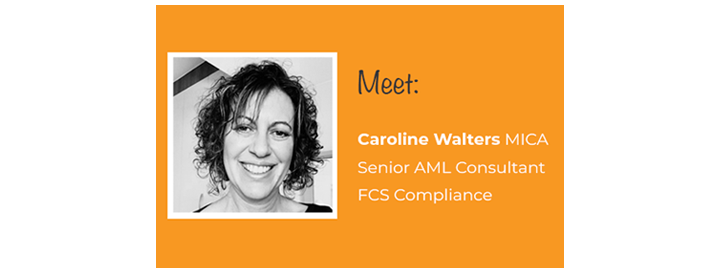- April 28, 2022
- Posted by: FCS Compliance
- Category: Blog

Find out more about the AML experts at FCS. In this interview, we introduce you to Caroline who, previous to FCS Compliance, worked for Thames Valley Police for 13 years, investigating organised crime, anything from theft through to fraud.
Caroline Walters – interviewed by Alison Blease, PR Director, FCS – March 2022.
Today I’m talking to Caroline Walters, senior anti-money laundering (AML) consultant and co-founder of FCS Compliance. Lovely to see you. Let’s start at the beginning – I believe like most of the FCS Compliance team, you have a background in law enforcement?
Yes, I worked for Thames Valley Police for 13 years where I investigated organised crime, anything from theft through to fraud. Whilst I was there, I also worked as part of the Child Protection Team, investigating serious crime relating to child abuse.
And this is where you met Jerry, your late husband and co-founder of FCS Compliance?
Yes!
And then you both moved to the Channel Islands?
That’s right. We relocated to Guernsey where Jerry was involved in investigating off-shore trusts and I worked in health care compliance. Essentially this meant ensuring that health care professionals were compliant in all aspects of patient care. The cases I worked on were frequently complex and involved detailed investigation, much as in my previous job at Thames Valley Police and in my current role at FCS Compliance.
You’ve led us nicely into FCS Compliance! Tell me how the business came about.
FCS Compliance came into being in 2016. The Money Laundering Act of 2017 was close on the horizon and we knew that we had the skill set and knowledge to help companies understand their responsibilities in being compliant. There was real gap in the market. The legislation was new and estate agents were forced in to getting up to speed quickly. What they needed was a hotline they could call to seek advice and reassurance from professionals who understood what they needed to do if they were to meet their anti-money laundering obligations and trade within the law. And we were able to offer this. And what was your role within the company?
I looked after compliance – so advising on the processes that business needed to put in place if they were to meet their AML obligations.
Your advice has clearly paid off, as I understand you have a rather impressive success rate.
We do – none of our clients who have been subject to an HMRC inspection – and there have been quite a number over the years – has ever failed. How has the business changed from those early days? It’s definitely grown and diversified its client base, but the core values of the business remain the same. We have a great team with a diverse range of expertise, not just in crime enforcement and financial fraud but in legal know-how too. We all have enquiring minds – an essential pre-requisite in this job. Undoubtedly, it’s our combined knowledge and understanding of the sector, that enables us to provide clients with the best possible advice and practical help. Between us we really do have an absolute depth of knowledge. em> And has the AML sector changed too? It has. Enquiries have become more detailed and complex over time. Legislation has changed as the global risk to money laundering has increased. Parts of the lettings market and art market are now subject to money laundering legislation – it just doesn’t stand still.
Tell me a bit about the specifics that the art market has to contend with.
I think it’s fair to say the art market is still getting to grips with AML legislation and guidance. It’s a good few years behind property, which has been working with the legislation for some five years. It was in January 2020, as part of the Fifth Money Laundering Directive, that art market participants – and some letting agents too – became subject to money laundering legislation. There’s much more immediacy surrounding the art world and the funding side of the sector is also a big concern.
What are estate agents most concerned about right now?
We’re getting lots of queries about sanctions and the situation with Russia. It’s a rapidly evolving picture and a complex one too. Agents want to make sure they’re compliant and are rightly concerned.
I’m sure that comes as no surprise to anyone reading this, in fact we’re focussing on sanctions in our main newsletter feature this month.
The situation is far from black and white – although the same can be said for much of compliance!. What do you like most about the job you do? I love the complexity of the job – no two enquiries are the same. I think I speak for the whole team on this. I like using my initiative and applying an investigative mind to my daily work.
What are the most common mistakes you see clients make?
Luckily many trusts are quite used to working with us now and know exactly what we need – in fact they often pre-empt our questions – in order for us to complete due diligence. It certainly helps us get to what we need as efficiently as possible.
And finally, is there a top tip you can share with clients?
My top tip relates to your last question. Off-shore companies – always drill down to the share register, it’s all to easy to get distracted and miss what you’re looking for.
Thank you for your time today Caroline, it’s been fascinating to talk to you.

